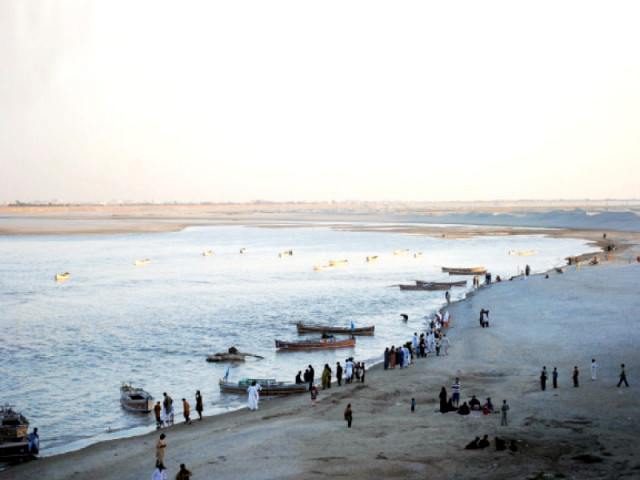Fisherfolk caravan starts its journey to Islamabad to save the rivers
Over half a dozen vehicles will pass through nine districts in Sindh and 11 in Punjab.

People enjoy boat rides in the Indus River at Al-Manzar, Jamshoro. The ‘People Caravan’, a group protesting against the construction of dams which decrease water flow in rivers, held a ceremony on Saturday at Al-Manzar after which it started a rally to Islamabad. PHOTO: INP
With only a few people by his side, the leader of the fishermen community embarked upon a drawn-out struggle to free the rivers from dams and unnatural control of the flows.
The chairperson of the Pakistan Fisher Folk Forum, Syed Muhammad Ali Shah, started the long march to Islamabad on Saturday after a ceremony on Friday at Al Manzar - a formerly idyllic tourist attraction at Kotri Barrage, Jamshoro.
The ‘People Caravan’, comprising over half a dozen vehicles, will pass through nine districts in Sindh and 11 in Punjab before reaching Islamabad on March 14, which is the International Day of Action for Rivers and Against Dams. Several hundred people attended the caravan’s starting ceremony and were entertained by folk music, dance and tableaus.
During their journey, the fishermen will organise mobilisation programmes and rallies in each district. The movement will continue even after the march ends.
The forum wants a permanent ban on the construction of new dams and decommissioning of the existing ones. The secondary demands include preventing river pollution, restoring delta and the contaminated fresh water lakes and checking sea intrusion in Thatta and Badin by discharging 35 million acre-feet water downstream Kotri barrage, among others.
“It’s not just a matter of livelihoods of the agriculturists and fishermen - the drying up of the river due to artificial diversions and control has affected the ecology, flora and fauna, and equally important, the culture of the downstream communities,” said the chairperson. “We [fishermen] are the first to closely witness this degradation and that is why it is up to us to spearhead a movement to save it.”
Shah, however, understands very well that his efforts are destined to fetch little, if anything, at this stage given the dispute between Pakistan and India over dams.

In his opinion, the public is just as much to be blamed as the politicians and bureaucrats for ignoring the issue. “People tend to think that rivers are only for irrigating land and for fishing - they overlook the ecological significance and the environment.”
He maintains that a majority of the people are in favour of dams. “Even the Sindhi nationalist leaders, who have seen the destruction in the two coastal districts, have no objection to building new dams on Indus, except the Kalabagh Dam.”
Save the rivers, stop the dams
“The people will have to nurture an anti-dam thinking to save their civilization because civilizations are created by rivers,” said Dr Suleman Abro, head of the Sindh Agriculture and Forest Workers Organisation.
Zulfiqar Halepoto of the Sindh Democratic Forum suggested to approach and dissuade the foreign diplomats and international financial institutions which are funding dams in Pakistan.
Sindh Agriculture University’s Prof. Ismail Kunbhar called for an independent commission of national and foreign experts to assess the ecological, environmental, economical and social losses suffered by the Indus delta and its inhabitants. “In the light of the findings, the government should compensate the people who have suffered losses,” Kunbhar suggested.
“We need a national rivers and water act which should protect water lifeline, establish local control, oppose commercial trade and stop interference of the IFIs,” said Karamat Ali, director of the Peoples Institute of Labour Education and Research.
The elderly fishermen leader from Badin, Tahira Ali Shah, raised spirits of her community by reminding them the struggle that they won against the rangers which had occupied lakes in Badin. The occupation over a dozen lakes in Badin ended in 2005 after four years long protest movement of the fishermen. “Indus delta is dying and so is its habitat. But we will not die without putting a formidable battle which will jolt the rulers,” she declared.
Published in The Express Tribune, March 3rd, 2013.



















COMMENTS
Comments are moderated and generally will be posted if they are on-topic and not abusive.
For more information, please see our Comments FAQ